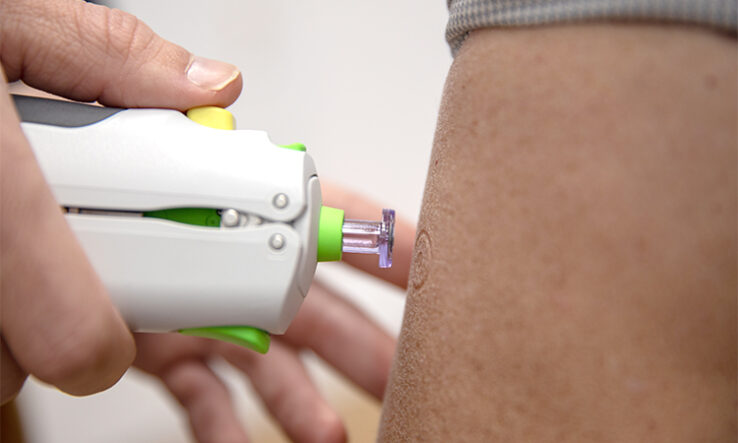
Image: Lloyd Mann
“Breakthrough” powder vaccine tests in UK described as first step towards “universal coronavirus vaccine”
Scientists in Cambridge and Southampton are testing a needle-free vaccine that they say could be a “breakthrough” in providing long-lasting and widespread protection against coronaviruses.
The DIOSynVax vaccine, which can be manufactured as a powder and delivered by air-jet technology, was developed by researchers at the National Institute for Health and Care Research’s clinical research facility in Cambridge.
Unlike licensed Covid-19 vaccines, which are based on existing sequences of the virus, the new vaccine was developed using computers to predict changes in the virus. It uses synthetic gene technology.
Its powder form also means that it could potentially be delivered to locations that do not have reliable cold-chain storage, such as in low- and middle-income countries.
‘Crucial stage of development’
First-stage clinical trials of the vaccine to examine safety have now been launched.
Jonathan Heeney, a professor of comparative pathology and head of the Laboratory of Viral Zoonotics at the University of Cambridge, developed the vaccine. He said the trials were a “crucial stage of development” and “the first step of taking this technology further towards what we hope will eventually become a universal coronavirus vaccine”.
Saul Faust, director of the National Institute for Health and Care Research’s Southampton clinical research facility, which is conducting some of the safety trials, said: “It is especially exciting that the clinical trial will test giving the vaccine through people’s skin using a device without any needles.
“Together with stable DNA vaccine technology, this could be a major breakthrough in being able to give a future vaccine to huge numbers of people across the world.”
He added that it was “critical that different vaccine technologies are tested as part of the UK and global response to the pandemic, because at this stage no one can be sure which type of vaccine will produce the best and most long-lived immune responses”.
This is just one of several projects looking to deliver coronavirus vaccines without needles, including through tablets, skin patches, inhalers and nasal sprays.
A version of this article appeared in Research Fortnight